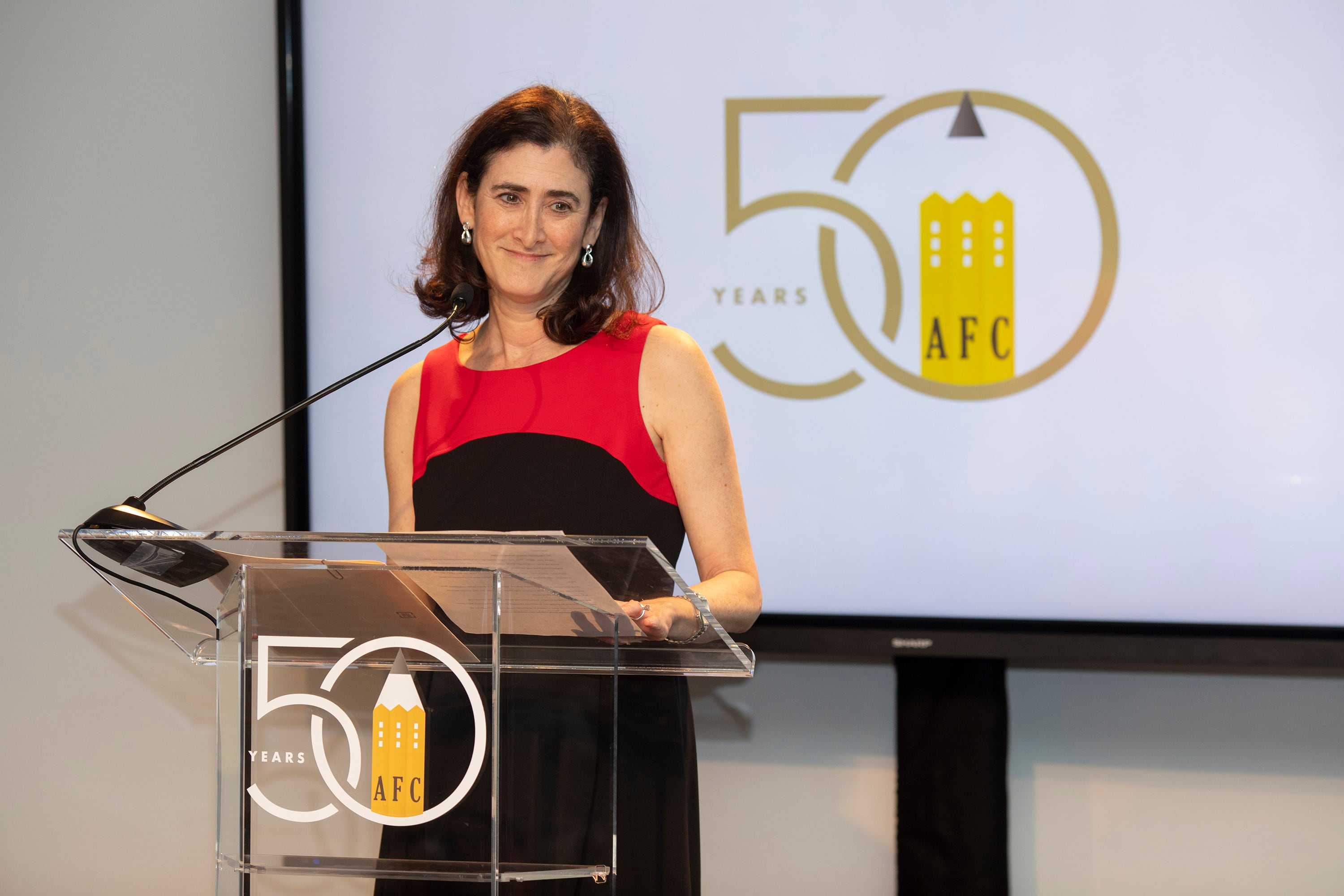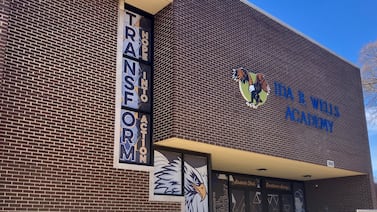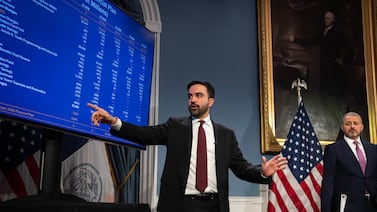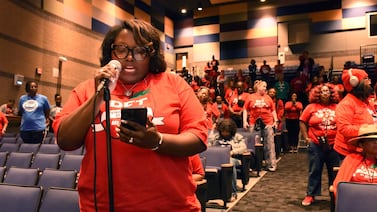Sign up for Chalkbeat New York’s free daily newsletter to get essential news about NYC’s public schools delivered to your inbox.
Kim Sweet, one of the city’s most prominent education advocates, got into the field by accident.
When she took a job at New York Lawyers for the Public Interest toward the beginning of her career in the late 1990s, she expected to work with adults with disabilities and mental health challenges.
“I showed up and they said, ‘You’re going to do education,’” Sweet recounted. “And from the very first call I had with a parent where I could help them through a difficult situation with their child’s school, I was hooked.”
For the past 18 years, Sweet served as executive director of Advocates for Children, an organization that helps economically disadvantaged families — including immigrants and caregivers of children with disabilities — navigate the school system’s labyrinthine bureaucracy. It also lobbies for policy changes to improve the system, from reducing suspensions to expanding Education Department staff in homeless shelters. And it wages high-profile legal battles when city officials won’t budge.
Sweet, 60, stepped down from her post earlier this month and has not yet determined what she’ll do next. Her replacement, Maria Odom, who helped run an organization that works with unaccompanied migrant children, took the helm last week.
On one of her final days at Advocates for Children, Chalkbeat caught up with Sweet about how much progress the city has made educating vulnerable children over the last 20 years, why the city struggles to provide required preschool seats for students with disabilities, and what she makes of mayoral frontrunner Zohran Mamdani’s vow to end mayoral control of city schools.
This interview has been edited for length and clarity.
What is your big picture assessment of how well the city’s public schools are serving high-needs students right now, including students with disabilities and English learners, compared to when you started in this space almost three decades ago?
I’ve had this job through eight chancellors, and with all of them, I think we’ve moved forward on some issues and backwards on others. One thing that is a constant is that in a system of this size, there is always much more work to do, and you just have to keep plugging at it.
When you say you’ve been able to move forward on some issues and not so much on others, have there been any major victories that you’re proudest of?
Universal pre-K I think was a very significant improvement for the New York City Public Schools. I’m very proud of the work that we did in collaboration with so many others to substantially reduce suspensions and arrests in the New York City public schools and the policies that led to that. Right now, I think New York City Reads, and the revamping of literacy instruction in New York City is an extremely important change that is long overdue.
One major change in special education policy that happened during your time was the effort to integrate students with disabilities in mainstream classrooms. What is your assessment of how successful that effort has been?
I’m someone that believes that students with disabilities can be integrated to a far greater extent than they are today. The supports that the students need to be successfully integrated still aren’t there in many situations.
What would it take to make that better? How do you think about the tradeoff of schools that are dedicated for students with more complex needs versus asking a wider net of schools to have a wider range of support?
I think at this point you need both. I think the challenge of inclusion in a big system like New York City’s is that successful inclusion requires flexibility and adaptation to the actual needs of individual students. And flexibility is not something that happens easily in a big system. Real inclusion requires partnering with parents and listening to them about the needs of their children.
What are the biggest things that still feel like works in progress?
I think my biggest frustration at this point may be that parents who advocate for their children are still too often treated as the enemy. This happens a lot in the special education context, where parents are treated like they’re trying to take advantage of the system, when really they’re doing what parents are genetically programmed to do, which is fight for their child. I think parents bring valuable information to the table for educators to partner with them and really serve their children.
I’ve interviewed lots of families who have kids with dyslexia or other challenges who have felt like they weren’t getting the support they needed in the city’s public schools. Do the literacy changes mean that you’re seeing fewer kids who are not getting the kind of quality instruction they need?
No, as I keep telling New York City public school leaders, we are still not at the point where the families calling Advocates for Children can get help with reading that their children need when they need it, and that is the ultimate goal. I think New York City Reads is an important step in the right direction. I think they still have a lot of work to do on interventions for struggling readers, and I’m pleased to see that they’re starting to embrace that work.
But my goal, personally, would be that if a family calls Advocates for Children and says that their child is not reading, that we can refer them to resources in the New York City public schools, and they can get the help they need. That still is not the case.
One thing that Advocates for Children has been at the forefront of advocating for are preschool students with disabilities who haven’t had access to seats that they’re legally entitled to, even as the city has dramatically expanded pre-K for general education students. Why do you think that problem hasn’t been solved?
That is a symptom of one of the main problems I’ve seen through all my years of advocacy. When the city builds a new system, they don’t take into account the needs of the students we serve, like students with disabilities. And they try to graft in their needs later and that never works.
You have to build a system from the start that is intended to be inclusive and considers all kids.
And I certainly hope that if the city further builds out its early childhood program under whoever the new mayor ends up being, that they start with an inclusive lens and build in children with disabilities from the very beginning.
Zohran Mamdani is leading in the polls. His highest profile plan in the K-12 space is to end mayoral control in its current form in favor of a model that shares more power with parents and other stakeholders, although he hasn’t shared very many specifics. Do you think that’s a good idea?
We share the frustration of many of our allies, many families, with aspects of the current governance system, in the sense that people feel disempowered in many respects. At the same time, as imperfect as the current system is, I’ve been pretty outspoken about the need to be careful that any changes we make do not have negative unintended consequences.
For example, just like we need checks and balances against discrimination and harmful decisions by a mayor, we also need to make sure there are checks and balances against elected parents and community boards that may try to exercise their powers in a discriminatory way. And examples of how that could happen would be school siting decisions — putting our schools for over-aged under-credited students or students with disabilities in undesirable locations. Or decisions to ban books with LGBTQ themes.
We were talking about universal pre-K — that required a relatively rapid commitment of resources and a high level of coordination of agencies. We want changes of this scale to remain a possibility under whatever government governance system we have.
To what extent do you think changes at the federal level, including gutting the U.S. Education Department, will affect high-need kids in New York City?
It’s hard to say at this point. I think it’s a scary time in many ways, and I am a world-class worrier. On a macro level, I worry about the impact of funding cuts, even if not directly to education, how funding cuts in other areas will impact funding for education. I worry about erosion of students’ rights and enforcement of those rights.
On an individual level, I feel for families, particularly immigrant families who need to drop their children off for school in the morning, not feeling secure that they’ll be able to pick them up at the end of the day. As a parent, I can’t imagine that being my situation and my heart really goes out to them.
Has your strategy about how aggressively to pursue litigation changed at all over time?
It’s funny because my training is as a litigator. Over time, I’ve become less enchanted with litigation as a problem-solving tool. I think it’s something we need to be able to do, and our work in the courts is important, but if we can solve it some other way, that may be more expeditious for families seeing actual results.
I don’t think it’s a secret that the cases move very, very slowly, and the DOE fights us tooth and nail once we get to court. If we’re working with the policy people, oftentimes we’re more aligned and can get things by agreement.
Do you have any advice for your successor?
My main advice to all advocates is to stay focused on the students and build bridges where you can. You can do a lot more together than you can do alone.
Alex Zimmerman is a reporter for Chalkbeat New York, covering NYC public schools. Contact Alex at azimmerman@chalkbeat.org.






